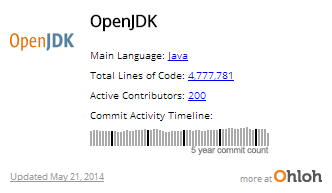Tinkerbell
Haxe on Wings

But first
A few thoughts on programming
Warning
Don't believe me.
Not even when I'm (mis)quoting clever people.
Don't believe them either.
Try things for yourself.
Particularly those that seem revolting at first.
We suck at this
Don't think so?
Would you seriously trust a bridge, let alone an airplane, built the way we build software?
We are not engineers!
That's a worthy goal, but it is far ahead.
There are no shortcuts.
Engineering comes from ingenuity.
Keep the fun
I think that it's extraordinarily important that we in computer science keep fun in computing. [...] We began to feel as if we really were responsible for the successful, error-free perfect use of these machines. I don't think we are. I think we're responsible for stretching them, setting them off in new directions, and keeping fun in the house. [...]
Methodologies
They are orthogonal to Programming
The ones that are about programming often cause more problems than they solve.
The ones that add value are about communication.
Embrace Nothingness
List of all proven methods to avoid bugs in code:
- Don't write code.
- End of list ...
Do not ruin the empty slate!!!1!1!
The codebase becomes a terrible mess all by itself.
No need to accelarate the process.
Leave yourself the room to maneuvre.
Trust your fellow programmers
- Trust in their willingness to learn and grow.
- Trust in their ability to complement the code you write. (Even if you are 100% positive they are heretically superstitious, that doesn't mean they are incapable)
- Don't impose decisions on them.
- Don't consider yourself smarter. It gives you the wrong perspective.
- Never be afraid to ask.
YAGNI / KISS
It seems that perfection is attained not when there is nothing more to add, but when there is nothing more to remove.
YAGNI
- Implementing things that may be useful later is a form of premature optimization.
- Adding what you need to a lean system is easier than bending a huge system that does almost but not quite what you need to do when you actually need.
- Be aware of adding implicit assumptions to your design. Example: HTTP
NOT KISS
Problem: You need to cut and pinch

KISS
Problem: You need to cut and pinch


Simplicity
- Easy and simple are two different things. Simplicity is hard to achieve and simple things are not necessarily easy to use. Just easy to to reason about.
- When in doubt, keep things small.
- Oversimplification is to simplicity what perfectionism is to perfection.
In a nutshell
There are two ways of constructing a software design: One way is to make it so simple that there are obviously no deficiencies, and the other way is to make it so complicated that there are no obvious deficiencies. The first method is far more difficult.
Divide and Conquer
There is evidence to suggest it works.
Also known as:
- Seperation of Concerns
- Single Responsibility Principle
The single responsibility principle states that every class should have a single responsibility, and that responsibility should be entirely encapsulated by the class.
A beginner's mind
In the beginner's mind there are many possibilities, in the expert's mind there are few.
Looking at Haxe
Does Haxe deliver on the promise Java failed to keep?
(That's a serious question, but for now let's go with:)
Of course it does!!!
Why?
No short lambdas
What's not in Haxe is as important as what is.
Also:

Bending Haxe

To what end?





What it's not
And never going to be
- One framework
- Finished
What it is
A continuous work in progess.
Many small, well documented packages.
- tink_core (hx: 529, md: 587 (67%))
- tink_macro (hx: 1310, md: 303 (36%))
- tink_lang (hx: 1934, md: 776 (38%))
- tink_priority (hx: 103, md: 110 (61%))
- tinx_autospod (hx: 146, md: 15 (30%))
- tink_template (hx: 809, md: 213 (31%) )
- More to come ...
Tinkerbell Core
- Error handling
- Asynchrony
- Lazyness
- Signals
- And more ...
Philosophy
Composability!!! Composability!!! Composability!!!
Example: tink.core.Signal has a map and a filter method. Let's make it pausable!
function pausable<T>(s:Signal<T>) {
var paused = false;
return {
signal: s.filter(function (_) return !paused),
isPaused: function () return paused,
setPaused: function (param) paused = param,
}
}More composing
typedef Button {
var clicked(default, null):Signal<MouseEvent>
}
var up:Button = ...,
down:Button = ...;
var delta = up.clicked.map(function (_) return -1).join(
down.clicked.map(function (_) return 1)
);
$type(delta);//Signal<Int>Tinkerbell Language Extensions
- Trailing argument
- Short Lambdas
- Extended and optimized loops
- Partial implementation (much like traits)
- Syntactic forwarding
- Function options
- And more...
Usage
Use in any class with implements tink.Lang.
Extended syntax is applied to the class and all subclasses.
class Point implements tink.Lang {
public var x = (.0);
public var y = (.0);
@:calculated var length = Math.sqrt(x * x + y * y);
}Trailing arguments
Do you hate it to have an expression end with })]})?
Mysql.connect() => {
database : 'test',
user : 'user',
password : 'password',
}Short Lambdas
[] => 4;
[x] => 2 * x;
[x, y] => x + y;
x => 2 * x;
@do body;
@do(x, y) trace(x + y);
@f value;
@f(x, y) (x + y);function () return 4;
function (x) return 2 * x;
function (x, y) return x + y;
function (x) return 2 * x;
function () body;
function (x, y) trace(x + y);
function () return value;
function (x, y) return x + y;And more Short Lambdas
switch _ {}
switch [_, _] {}
@do switch _ {}
@f switch _ {}function (x) return switch x {}
function (x, y) return switch [x, y] {}
function (x) switch x {}
function (x) return switch x {}Nice example
myButton.clicked.handle() => @do {
trace('clicked!!!');
}
http.load(someUrl).handle() => @do switch _ {
case Success(data): trace('loaded $data');
case Failure(error): trace('ERROR: $error!');
}Extended loops
for (i += .5 in 0...100) {}
for (i -= .5 in 100...0) {}
for ([b in bananas, m in monkeys]) m.eat(b);
for ([b in bananas, m in monkeys || monkey[0]]) m.eat(b);
for (key => value in map) {}
for ([m in monkeys, i++]) {}Optimized loops
@:tink_for({
var i = 0, a, l;
{
a = untyped __call__('array_values', @:privateAccess this.h);
l = untyped __call__('count', a);
}
}, i < l, a[i++])
function iterator():Iterator<T>;- Usually a speed up of factor 1.5 to 4 for loops
- Factor 40 for lists on flash and 30 for string map keys on java
Partial implementation
Interfaces can have implementation
interface Enumerable<T> implements tink.Lang {
@:calc var length = fold(0, function (count, _) return count + 1);
function fold<A>(init:A, calc:A->T->A):A {
forEach(function (v) init = calc(init, v));
return init;
}
function forEach(f:T->Void):Void
for (v in this) f(v);
function map<A>(f:T->A):Array<A> {
var ret = [];
forEach(ret.push);
return ret;
}
}Partial implementation
Partial implementation can have dependencies
interface Enumerable<T> implements tink.Lang {
/* ... */
@:usedOnlyBy(iterator)
var elements:Array<T> = [];
@:usedOnlyBy(forEach)
public function iterator():Iterator<T> {
return elements.iterator();
}
}Syntactic forwarding
class Stack implements tink.Lang {
@:forward(push, pop, iterator, length) var elements:Array;
public function new() {
this.elements = [];
}
} Function options
function connect<T>(
args = {
host: 'localhost',
port: 3306,
'database': 'test',
username: (_ : String),
password: (_ : String)
}
) {
return Mysql.connect(args);
}Tink Auto SPOD Extension
Automatically connects. Creates missing tables and adds missing columns. Initializes SPOD.
Usage: -lib tinx_autospod tinx.AutoSpod.use() (See #3037)
Configuration through dbconfig.uri in working directory
mysql://user:password@host:port/dbname
sqlite:path/to/file.db
alias:path/to/directoryTink Template
Largely haxe.Template compatible compile time template language with rich syntax,
including switch, while, for, var, function.
Templates become true Haxe classes on the fly, that can implement interfaces and extend classes.
Usage: -lib tinx_autospod tinx.AutoSpod.use()
No support for import and using (see #2868).
Example
//Example.tpl
::static inline var TITLE = 'Awesome blog'::
::static function header(?title = TITLE)::
<!DOCTYPE html><html><head><title>::title</title></head>
<body>
::end::
::static function index(posts:Array<Post>)::
::header()::
::for p in posts:: ::excerpt(p):: ::end::
::footer()::
::end::
::static function excerpt(p:Post)::
::p.excerpt()::
<a href="/post/::p.id::">Read more</a>
::end::
::static function doDefault()
Sys.print(index(Post.manager.all()))
::
::static function main()
Dispatch.run(Web.getURI(), Web.getParams(), Example)
::
Escaping
Just use the type system.
abstract Html {
public function new(s:String):Void;
@:from static public function escape(s:String):Html;
@:from static function ofMultiple(parts:Array<Html>):Html;
@:from static public function of<A>(a:A):Html;
}The Future
- More tests
- More modules
- More users?
- More contributors??
Join Now!


